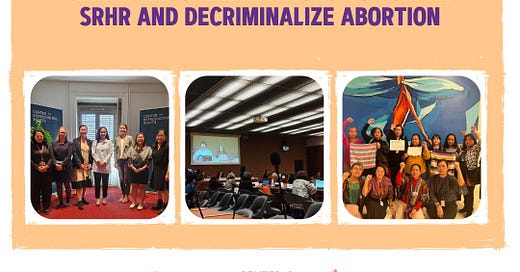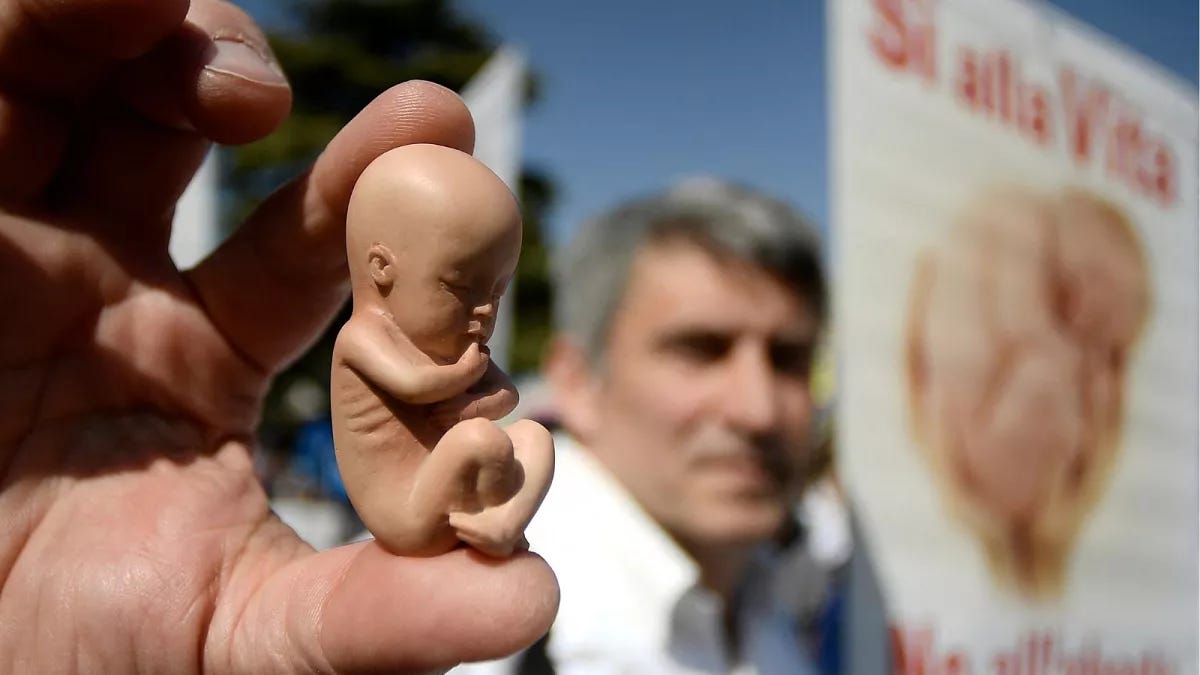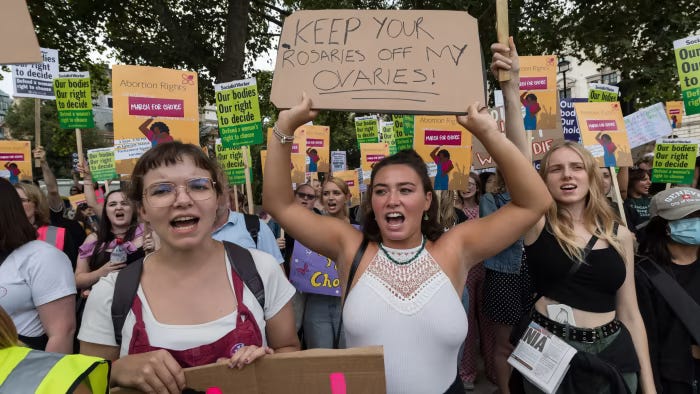[Please see the previous 3 related posts. Part 1 and Part 2 and Part 3]
The objectives of Sri Lanka’s “Empowerment of Women” Act shall be to provide for the empowerment of women by - among other dubious and controversial means,
“the enforcement of the obligations relating to women undertaken by the State under
the Convention on the Elimination of All Forms of Discrimination Against Women, (“CEDAW”).
“Eliminating discrimination” sounds nice on the surface, but Let us understand what this radical feminism instrument of the United Nations - CEDAW, does. Here let us get a glimpse of how the unelected bureaucrats in the CEDAW committee bully nations into liberalising abortion laws. They demand nothing less than abortion on demand, at any time during the baby’s gestation, and for what ever reason.
Here is a Letter to U.S. Senate explaining pro-abortion language in CEDAW resolution.
It states “To cite one example among many, the official UN CEDAW compliance committee criticized Croatia for “the refusal, by some hospitals, to provide abortions on the basis of conscientious objection of doctors. The committee considers this to be an infringement of a woman’s reproductive right.” Moreover, as recently as July 3, the European Parliament narrowly voted to adopt a sweeping report calling for removal of all limitations to abortion by current European Union members such as Ireland, Spain and Portugal, and by nations seeking membership, such as Poland and Malta. The report cited CEDAW as grounds for its assertion that there is an “international legal framework” under which all European Union nations should recognize abortion as a “fundamental right.”
Read the entire letter here.
Here is another example of how CEDAW demanded that Northern Ireland drop its legal protections for unborn children. Read it here.
Kelsey Zorzi reports on how the United Nations bullies nations into legislating for the murder of its children under the guise of liberty and empowerment:
In 2000, the United Nations (UN) entity that monitors Member States’ compliance with the Convention for the Elimination of All Forms of Discrimination Against Women—the Committee on the Elimination of All Forms of Discrimination Against Women (CEDAW)—lodged an official complaint against Luxembourg, claiming that its abortion laws “appear anachronistic,” and its government “appears to lack the commitment to review and adapt [abortion] legislation to changing attitudes and developments in the European region.”1 The abortion laws of Luxembourg were not, at the time, out of step with international law, which does not require States to legalize abortion.2 Luxembourg already allowed abortion in many circumstances, including whenever a physician determined that a pregnancy threatened a woman’s life or health, in cases of rape, incest, or fetal impairment, and even simply for social or economic reasons.3 Yet, because Luxembourg did not permit on-demand abortion, it was subject to censure by a United Nations body.4
This censure had no basis in international law, but its insubstantial legal grounding did not prevent it from being ultimately effective. 5 In 2012, Luxembourg legalized abortion on-demand, and admitted that the change was partially made to ensure it was in step with the laws of other European countries.6 Prior to taking this step, however, Luxembourg joined the now-widespread practice of pressuring Latin American nations to change their abortion laws through the UN’s Universal Periodic Review.7 In 2010, during the seventh session of the Universal Periodic Review, Luxembourg recommended that El Salvador “[i]nitiate a national dialogue on the right of women to reproductive health, including with respect to the consequences of restrictive laws on abortion, including the criminalization of abortion.”8 This brief history of the UN’s interaction with Luxembourg illustrates a trend that deserves significantly more attention than it has received. Working beyond its mandate and outside the scope of international law, the UN, through its various organs and bodies, has developed a complex, energetic, and potent system to pressure States to adopt certain domestic abortion laws.9 There is evidence that the UN’s fervent advocacy for abortion has contributed to changing abortion laws, despite the fact that the life of the unborn child is protected under international law.10
Footnotes
1. Rep. of the Comm. on the Elimination of Discrimination Against Women on its TwentyThird Session, U.N. Doc. A/55/38, ¶ 406 (June 30, 2000), http://www.un.org/womenwatch/daw/ cedaw/reports/a5538.pdf [hereinafter “Rep. of CEDAW: Luxembourg 2000”]. This was not the first time CEDAW pressured Luxembourg to liberalize its abortion laws; for example, the Committee noted in its 1997 report that it was “deeply concerned at the existing legislation on abortion” in Luxembourg because it “penalized women.” U.N. Concluding Comments of the Comm. on the Elimination of Discrimination Against Women, at ¶ 210 (June 25, 1997), http:// www1.umn.edu/humanrts/cedaw/cedaw-luxembourg.htm [hereinafter “Concluding Comments of CEDAW: Luxembourg 1997”].
2. See U.N. Population Div., Dep’t of Econ. & Soc. Affairs, Major Dimensions of Abortion Policy Part II.B.1 (2002), http://www.un.org/esa/population/publications/abortion/ (discussing how abortion laws are governed by State legislation, and no international standard yet exists).
3. De l’avortement [Abortion] [Penal Code] tit. VII, ch. 1, art. 353 (Nov. 15, 1978) (Lux.), http://www.hsph.harvard.edu/population/abortion/LUXEMBOURG.abo.htm.
4. See Rep. of CEDAW: Luxembourg 2000, supra note 1, ¶ 406. 410 Catholic University Law Review [Vol. 65:409
5. See Hillary White, Luxembourg Legalises Abortion on Demand, LIFESITE (Nov. 23, 2012, 1:34 PM), https://www.lifesitenews.com/news/luxembourg-legalises-abortion-on-demand.
6. See Charline Lebrun, Restrictions on Abortion in Luxembourg To Be Relaxed, LUXEMBURGER WORT (Nov. 23, 2012, 7:39 AM), http://www.wort.lu/en/luxembourg/restrictionson-abortion-in-luxembourg-to-be-relaxed-50af1938e4b0246412999677; White, supra note 5. In 2014, the government of Luxembourg liberalized abortion law to an even greater extent by removing the requirements that women undergo a second consultation with a medical doctor and show they are under distress because of their pregnancy. See Luxembourg Decriminalises Abortion, GÈNÉTHIQUE (Apr. 11, 2014), http://www.genethique.org/en/content/luxembourgdecriminalises-abortion#.VpPobJMrKA8. In practice, however, the requirement of showing distress never prevented a woman from obtaining an abortion. See id.
7. See Luxembourg Recommendation to El Salvador, http://www.upr-info.org/database/ (in the drop down menus, select “El Salvador” for State Under Review, “Luxembourg” for Recommending State, “Women’s Rights” for Issue, “1st Cycle” for Cycle, and “Recommendations and Voluntary Pledges” for Recommendations & Voluntary Pledges; then click on Go; the source is the third result).
8. Id.
9. See Press Release, Irish Family Planning Assoc., Government Under Pressure at the UN re Implementation of Abortion Ruling (Mar. 15, 2012), https://www.ifpa.ie/news/irish-government -under-pressure-at-un; Stefano Gennarini, Nigeria Refuses To Give in to UN Pressure on Abortion, ‘Sexual Rights’, LIFESITE (Sep. 19, 2015, 2:39 PM), https://www.lifesitenews.com/news/unfpafoiled-by-nigeria-on-abortion-sexual-rights; Rebecca Oas, UN Human Rights System Becomes ProAbortion Echo Chamber, C-FAM (Nov. 26, 2014), https://c-fam.org/friday_fax/un-human-rightssystem-becomes-pro-abortion-echo-chamber/.
10. Various international instruments recognize the right to life of the unborn child. For example, the Convention on the Rights of the Child explicitly states, “the child, by reason of his physical and mental immaturity, needs special safeguards and care, including appropriate legal protection, before as well as after birth.” G.A. Res. 1386 (XIV), Preamble, Convention on the Rights of the Child (Nov. 20, 1989), http://www.cirp.org/library/ethics/UN-declaration/. In addition, the International Covenant on Civil and Political Rights prohibits the death penalty for pregnant women, which is intended to protect the right of the life of the unborn. See G.A. Res. 2200A (XXI) art. 6, § 5, International Covenant on Civil & Political Rights (Mar. 23, 1976), https://www1.umn.edu/humanrts/instree/b3ccpr.htm. As the draft of the International Covenants on Human Rights states: “The principal reason for providing in paragraph 4 of the original text that the death sentence should not be carried out on pregnant women was to save the life of an innocent unborn child.” G.A. Rep. of the Third Comm., 12th Sess., U.N. Doc. A/3764 (Dec. 6, 1957) (emphasis added).
Full paper here: https://scholarship.law.edu/cgi/viewcontent.cgi?referer=&httpsredir=1&article=3366&context=lawreview
CEDAW and the UN has over the years schemed on liberalising abortion in Sri Lanka. Here are some insights into their previous attempt.
1 The Bill on Women’s Rights
2 The Abortion Bill
3 CEDAW Exposed
4 The Strategy of Deceit
Sri Lanka’s apparently innocuous Women’s Empowerment Act and its devious counterpart the Gender Equality Act needs to stopped. Help Sri Lanka! Can you, for example, write to our media channels, engage in tweeting to the media and politicians, and lobby the MPs?






